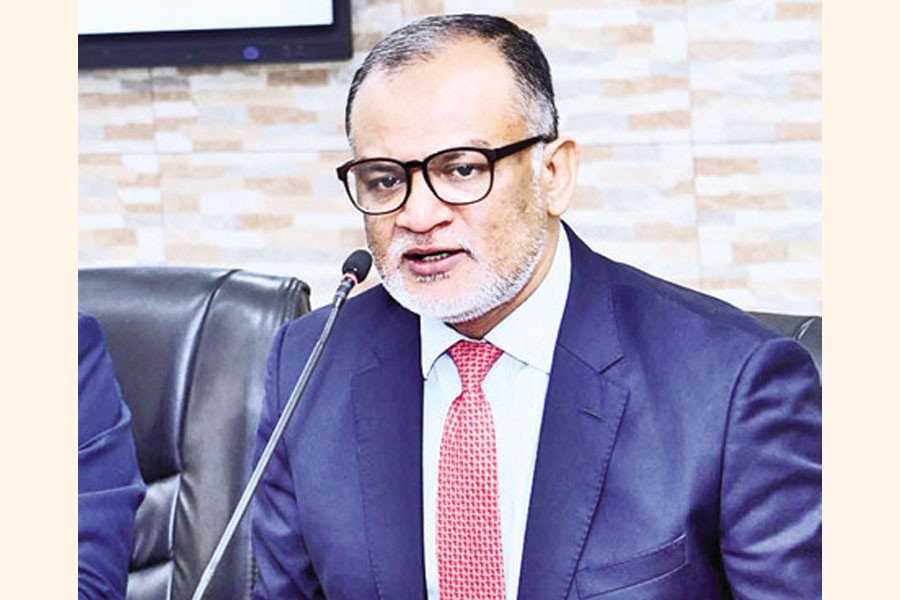
Published :
Updated :

Commerce Adviser Sk Bashir Uddin has said there is an urgent need to update Bangladesh's automobile policy to address critical issues such as vehicle imports and local manufacturing, while aligning it with broader economic and environmental goals.
Speaking as chief guest at a seminar titled "Automobile Policy for Green Growth and Competitive Economy," held on Wednesday in Dhaka, he called for removing inconsistencies within related policies to fully harness the country's demographic dividend and boost labour productivity.
Adviser Bashir highlighted that although Bangladesh has invested billions of taka in infrastructure, the country has yet to realise significant economic benefits.
He stressed the importance of identifying sector-based dividends and integrating them into coherent policies to unlock sustainable economic growth.
The seminar, jointly organised by the Economic Reporters Forum (ERF) and Policy Exchange Bangladesh (PEB) at the ERF auditorium in Dhaka, featured keynote speaker PEB Chairman Mashrur Reaz and a panel including Abdul Haque, president of the Bangladesh Reconditioned Vehicles Importers and Dealers Association (BARVIDA); Anwar-ul Alam Chowdhury, president of the Bangladesh Chamber of Industries; Rizwan Rahman, former president of the Dhaka Chamber of Commerce and Industry (DCCI); and Motiur Rahman, chairman of Uttara Motors.
Adviser Bashir underlined the significant role of logistics in Bangladesh's growth, noting that logistics costs remain among the highest globally.
Citing the keynote paper, he pointed out that logistics currently accounts for 20 per cent of GDP but heavily relies on costly foreign currency expenditures.
"With economic growth, the demand for logistics services is projected to rise from 41 billion tonne-kilometres to 300 billion tonne-kilometres."
While the automobile sector represents a small portion of logistics, it plays an important role.
The adviser stressed that automobile policy must consider environmental concerns, economic transaction values, and national priorities to ensure efficient spending and sustainable development.
"Investment in the last 16 years was based on fallacies-Tk 20 was spent for Tk 1 of actual investment," he remarked, calling for clear, integrated policies that include green transportation and state contingency plans.
Addressing vehicle imports, Mr Bashir said the policy should factor in vehicle age, environmental impact, transaction values, and per capita income to meet the country's economic growth needs.
Highlighting Bangladesh's unique geography with over 200 rivers, he noted the country has yet to capitalise on inland shipping trade, where only $1 billion of the $27 billion freight trade is controlled by local businessmen.
Keynote speaker PEB Chairman Mashrur Reaz pointed out transportation weaknesses causing high logistics costs and inefficiencies.
He stated that reducing logistics costs by 25 per cent could boost exports by 20 per cent, while increasing truck speeds from 20 km/h to 40 km/h could raise exports by 3.7 per cent.
Also, a 0.5 per cent reduction in vehicle emissions could save $1.63 billion annually.
Mr Reaz also noted that Bangladesh ranks 87th globally in car imports, with cars being the 28th most imported product nationally.
Car imports and sales have fallen sharply due to factors such as rising dollar prices, foreign exchange crises, macroeconomic instability, increased duties, and political turmoil.
In 2023, car sales dropped 35 per cent while the dollar rose 26 per cent, pushing car prices up by 10 per cent and dampening demand, especially for low-end reconditioned cars.
Abdul Haque, president of BIRVIDA, called for detailed studies on car imports considering vehicle economic lifespans and urged the automobile sector to be developed in line with Bangladesh's graduation from LDC status.
Former DCCI President Mr Rizwan described Bangladesh as a poorly managed but resource-rich country.
He stressed that efficient mass transport systems reflect sound investment and well-crafted policies.
He urged policy integration and stable taxation frameworks to attract investment in the automobile sector, especially for electric vehicles, which are key to the country's green transition.
smunima@yahoo.com


 For all latest news, follow The Financial Express Google News channel.
For all latest news, follow The Financial Express Google News channel.